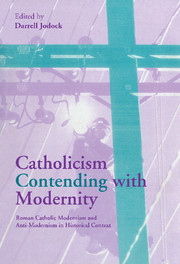 Catholicism Contending with Modernity
Catholicism Contending with Modernity Published online by Cambridge University Press: 30 October 2009
Who were the Modernists, and who were the anti-Modernists? Several persons who are usually included on each side of the controversy will be identified below. Our purpose is not to offer a comprehensive directory but to illustrate the variety of Modernist and anti-Modernist concerns and to introduce some of the persons discussed in the chapters that follow.
Readers already familiar with the dramatis personae may want to skip to chapter one.
THE MODERNISTS
The following are among those persons usually considered to be Modernists:
maurice blondel (1861–1949), a French philosopher. He is sometimes considered a precursor of Modernism and at other times included as a Modernist. His disagreements with Loisy regarding the relationship between biblical criticism and dogma, his readiness to arrive at orthodox conclusions, and the failure of his thinking to advance beyond its early formulations incline some to see him as a precursor. His sense of vocation and his quest for an understanding of humanity that was “open” to the divine rather than closed off from it – one that did not employ the rigid nature/supernature distinction of the neo-scholastics – incline some to see him as a Modernist. In any case, his thought influenced other Catholics with more explicit Modernist sympathies.
He is best known for his doctoral thesis, published in 1893, L'Action: essai d'une critique de la vie et d'une science de la pratique (Action: Essay on a Critique of Life and a Science of Practice) and his Lettre sur les exigences de la pensée contemporaine en matière d'apologétique (Letter on Apologetics) in 1896.
To save this book to your Kindle, first ensure [email protected] is added to your Approved Personal Document E-mail List under your Personal Document Settings on the Manage Your Content and Devices page of your Amazon account. Then enter the ‘name’ part of your Kindle email address below. Find out more about saving to your Kindle.
Note you can select to save to either the @free.kindle.com or @kindle.com variations. ‘@free.kindle.com’ emails are free but can only be saved to your device when it is connected to wi-fi. ‘@kindle.com’ emails can be delivered even when you are not connected to wi-fi, but note that service fees apply.
Find out more about the Kindle Personal Document Service.
To save content items to your account, please confirm that you agree to abide by our usage policies. If this is the first time you use this feature, you will be asked to authorise Cambridge Core to connect with your account. Find out more about saving content to Dropbox.
To save content items to your account, please confirm that you agree to abide by our usage policies. If this is the first time you use this feature, you will be asked to authorise Cambridge Core to connect with your account. Find out more about saving content to Google Drive.